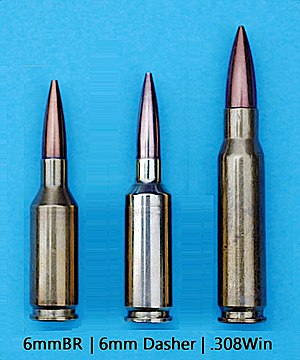6 mm BR Remington
| 6 mm BR Remington | |
|---|---|

6mm BR, 6mm Dasher and .308 Winchester cartridges
|
|
| Type | Rifle |
| Place of origin | United States |
| Production history | |
| Designer | Wildcats: Various Commercial: Mike Walker |
| Designed | Wildcats: 1962-1963 Commercial: 1978 |
| Produced | 1978-present |
| Variants | Several. See article. |
| Specifications | |
| Parent case | .308×1.5-inch Barnes |
| Case type | Rimless, Bottleneck |
| Bullet diameter | .243 in (6.2 mm) |
| Neck diameter | .270 in (6.9 mm) |
| Shoulder diameter | .458 in (11.6 mm) |
| Base diameter | .473 in (12.0 mm) |
| Case length | 1.560 in (39.6 mm) |
| Primer type | small rifle |
| Maximum CUP | 52,000 CUP |
| 6mm Norma BR | |
|---|---|
| Type | Rifle |
| Place of origin | Sweden |
| Production history | |
| Manufacturer | Norma |
| Produced | 1996 |
| Specifications | |
| Parent case | 6mm BR Remington |
| Case type | Rimless, Bottleneck |
| Neck diameter | 0.271 in (6.9 mm) |
| Shoulder diameter | 0.458 in (11.6 mm) |
| Base diameter | 0.469 in (11.9 mm) |
| Rim diameter | 0.473 in (12.0 mm) |
| Case length | 1.560 in (39.6 mm) |
| Overall length | 2.440 in (62.0 mm) |
The 6mm BR is a centerfire cartridge created for benchrest shooting. The cartridge is also known as the 6mm Bench Rest or simply 6 BR, and has also developed a following among varmint hunters because of its efficiency. There are two basic variants of very similar dimensions, known as the 6mm BR Remington and the 6mm Norma BR.
Soon after the introduction of the .308×1.5" Barnes cartridge, wildcatters and experimenters began developing their own wildcats based on the cartridge. By 1963 there were several .22 (5.7 mm) and .24 (6.1 mm) caliber cartridges based on the Barnes’ cartridge. The new cartridges’ accuracy and efficiency was noticed by the bench rest shooting community. The .24 caliber (6.1 mm) cartridge version became known as the 6mm Bench Rest or the 6mm BR due to its widespread use in the sport of bench rest shooting.
Because the cartridge was a wildcat and was not standardized until several years later, several variations of the cartridge existed. Cases required fire forming in the chamber as chambers of the rifles varied from one to another. Several 6mm BR variants exist apart from the Remington and Norma versions: the 6mm BRX, 6mm Dasher, 6 mm BRBS 6 mm UBL.
In 1978 Remington started manufacturing their Remington 40-X rifle in the 6mm BR and named their version of the cartridge the 6mm Bench Rest Remington. By 1988 Remington was also manufacturing ammunition. Remington continues to offer the 6mm BR Remington in the 40-X series rifles. The Remington version of this cartridge is now considered to be obsolete.
In 1996 Norma of Sweden introduced the 6mm Norma BR which was dimensionally similar to the 6mm BR Remington. However the chamber of the Norma version provided a longer throat making allowances for the seating of VLD bullets. This is the most common variation of the cartridge used today.
The 6mm Norma BR has become a popular chambering in match rifles used in 300 metres (328 yd) ISSF and CISM and other 300 metres rifle disciplines.
The 6mm BR Remington cartridge is based a necked down .308×1.5" Barnes cartridge which in turn is based on the .308 Winchester case shortened to 1.5 inches (38 mm). It is one of the earlier cartridges to follow the short, fat design concept. Short fat cartridges have characteristics that make them more efficient and accurate.
The 6mm Norma BR cartridge was introduced by Norma in 1996. It is based on the 6mm BR Remington cartridge, although where Remington's cartridge was intended for bullets of about 70 grains (4.5 g), Norma standardized their set of chambering specifications for a very low drag (VLD) bullet of over 100 grains (6.5 g), thus realizing the long-range capabilities of the cartridge. This required a much longer throat in rifles chambered for the Norma cartridge.
...
Wikipedia
